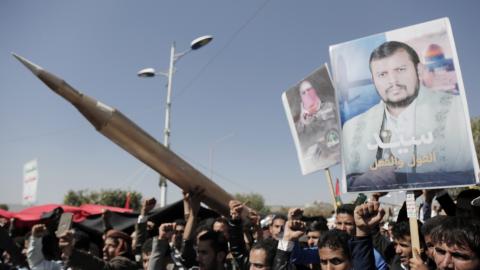Three Things about the Israel-Hamas War is a series from the Hudson Center for Peace and Security in the Middle East. Every week, Hudson Senior Fellows Michael Doran, Can Kasapoğlu, and Jonathan Schachter will join Research Fellow Zineb Riboua to offer an analysis of one thing—and one thing only—that is of particular importance to understand the Israel-Hamas war. Subscribe here.
Read their analysis below.
1. President Joe Biden is seeking to buy Iran’s quiescence at the expense of Israel’s security.
The strikes that the United States carried out on Friday and Saturday against Iran’s proxies in Iraq and Syria and against the Houthis in Yemen were a curious blend of actual deterrence and mere deterrence theater.
On the one hand, the large number and geographic breadth of the strikes—and the credible claim by American officials that they will likely continue—make them unprecedented in their seriousness. On the other hand, the Biden administration’s decision not to attack Iran directly—and to take the better part of a week to determine its response to the killing of three Americans in Jordan, talking to the press at every step along the way—helped Iranian officers embedded in proxy militias to hide and escape justice.
Domestic political considerations do not explain everything about the administration’s decision-making, but they certainly illuminate it. The limited scale of its retaliation operations protects the White House from accusations by hawkish Republicans that it is doing nothing to deter Iran, while telegraphing America’s punches preserves the diplomatic channel to Tehran.
Because Biden’s progressive base extols the effort to find a strategic accommodation with Iran and abhors Israel’s war in Gaza, Biden and his team are loath to impose significant economic or military costs on the mullahs. Between now and November, they prefer to buy Tehran’s quiescence.
They do so at the expense of Israel’s security. Last week, officials in the Biden administration signaled to Israel that they would likely begin withholding the supply of certain armaments, and strongly encouraged Jerusalem to accept a deal exchanging Israeli hostages held by Hamas for Palestinians incarcerated in Israel. If the White House can bring a permanent ceasefire to Gaza, the Biden officials calculate, then the attacks orchestrated by Iran will end.
This belief rests on the miscalculation that the conflict with Iran and its proxies is over Israel’s conduct in Gaza. Tehran and its puppets never miss an opportunity to make clear what the fight is really about: their long-held desire to drive the United States from the Middle East. The Biden team will not save the American-led order by weakening America’s allies.
— Michael Doran
2. The US campaign in the Middle East needs a clearly defined political objective rooted in deterring Iran.
Last week, Washington launched air strikes against Iran’s proxies in Iraq and Syria, hitting some 85 targets linked to militias backed by Tehran’s Revolutionary Guard Corps. Press sources claim that the campaign to date has killed some 40 paramilitaries. These air strikes, employing long-range B-1 strategic bombers, marked the first meaningful response to last week’s Iran-backed attacks that killed three American service members.
Yet for all its advanced weaponry, the US campaign lacks a clearly defined political objective. This is no accident: the flawed logic of the Biden administration’s Iran policy has made devising an objective nearly impossible. Unless Washington roots its continuing campaign in a strategy of deterring Iran’s Revolutionary Guard, Tehran will continue its subversive efforts until its last proxy has fallen.
The more limited objectives that Washington has thus far pursued carry the seeds of their own undoing. While the latest aerial bombardments have punished Iran’s proxies—albeit inefficiently, as the bombs released in this week’s strikes far outnumbered the hostiles killed—they have failed to halt the militias’ attacks. Similarly, the maritime coalition in the Red Sea has intercepted Houthi missile and drone strikes but has not succeeded in stabilizing vital shipping lanes.
These efforts have failed because they reflect a misunderstanding of the dynamics of deterrence. Since October 7, Americans in uniform have been attacked over 160 times in Syria, Jordan, and Iraq. Maritime traffic in the Red Sea has been systematically targeted by the Houthis, exacerbating a global crisis. Iran is not even trying to hide its signature drone and missile warfare fingerprints in these efforts.
To deter a puppeteer, one cannot attack only its puppets. Unless US-led military efforts directly confront Iran, the spiraling security challenges in the Middle East will only become more intractable.
— Can Kasapoğlu
3. Abba Eban was wrong.
At the Geneva Conference convened in December 1973 following the Yom Kippur War, Israeli foreign minister Abba Eban famously claimed that the Palestinians “never miss an opportunity to miss an opportunity.”
But Eban was wrong: for many Palestinians at least, the opportunities that Eban had in mind held no appeal. From the Peel Commission (1937) to the United Nations Partition Plan (1947), from Camp David (2000) to the Olmert proposal (2008) and the Kerry “framework” (2014), the Palestinian leadership has rejected every offer to create a Palestinian state as part of a peace agreement with a neighboring Jewish state.
Eban’s mistake—a mistake being repeated today by world leaders, diplomats, and journalists alike—is to assume that a Palestinian state and peace with Israel are necessarily linked, and that the former will lead to the latter. Palestinian leaders have a consistently different view, demanding a state but rejecting peace.
This point of view forms the Rosetta Stone for understanding nearly a century of Palestinian diplomatic decision-making. Some Palestinians undoubtedly desire peace with their Israeli neighbors. But once one recognizes that the leading Palestinian organizations and their leaders seek not peace but rather “revolution until victory,” as the Palestine Liberation Organization (PLO) infamously put it, and not the establishment of a Palestinian state but the destruction of the Jewish state, then Palestinian national decision-making begins to make sense: the serial rejections of statehood conditioned on peace; the indoctrination for and incentivization of terrorist violence; the continued references to 1948 rather than 1967; the desire for a solution imposed by the UN, the International Court of Justice, the International Criminal Court, or other international bodies.
The United States and other responsible countries have long conditioned the establishment and recognition of a Palestinian state on a peace agreement reached through direct, bilateral negotiations. This stance was reflected in the explicit obligations to which both sides committed under the Oslo Accords. Yet now there is renewed talk—in Washington, London, Paris, and elsewhere—of recognizing a Palestinian state even without such a peace agreement.
Such a decision would be disastrous. It would reward Palestinian rejectionism and terrorism, incentivizing more of both. More gravely, if a Palestinian state were created and recognized in the absence of a conclusive, comprehensive peace agreement, what motive would that state have to work toward peace?
Under those circumstances, a Palestinian state would make its war on Israel permanent: precisely the opportunity the Palestinian leadership and its supporters never want to miss.
— Jonathan Schachter















